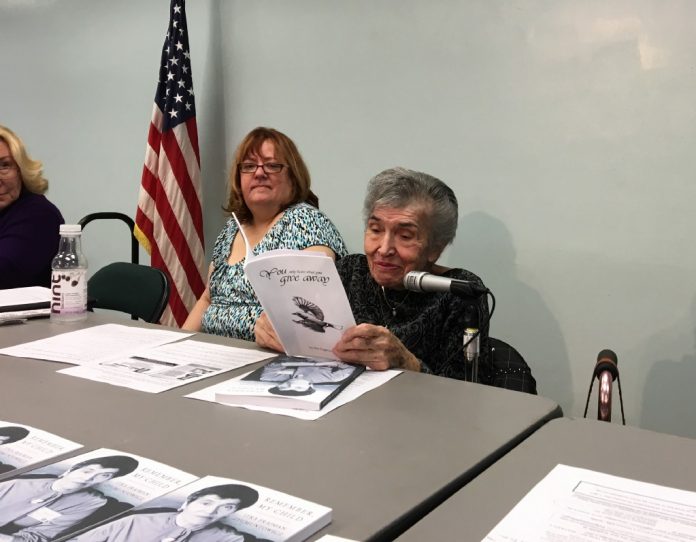Itka Zygmuntowicz, who survived captivity in three Nazi concentration camps, spoke at a recent Holme Circle Civic Association meeting.
Itka Zygmuntowicz is more than inclined to share the many horrid details of her captivity in three Nazi concentration camps, including the notorious Auschwitz-Birkenau, during World War II.
But when time is at a premium, the 91-year-old Holme Circle resident prefers to interject her original poetry, like she did during the monthly meeting of the Holme Circle Civic Association on April 26 before a rapt audience of dozens at St. Jerome’s School.
“In a poem, you can feel a lot of meaning in a few words,” Zygmuntowicz said before reciting excerpts from one of several autobiographical books she has authored.
One of the poems contains the passage: “25673 is now my new name. They try to reduce me to a number, dehumanize me every day … but regardless how hard they try, they cannot take my feelings away.”
Another states: “If there is a hell in the other world, I don’t think it could be as terrible.”
Zygmuntowicz also recited words of wisdom imparted on her by her late mother, who was murdered along with her father and two siblings at Auschwitz.
When Zygmuntowicz was 13, the Nazis invaded her native Poland. One day, a group of children surrounded her and abused her because she is Jewish. When she returned home, her mother said to her, “Who you are doesn’t depend on how others treat you. It depends on how you treat others.”
Two years later, the Nazis ordered her family to leave their small village, or shtetl, and relocate to a segregated ghetto. A year after that, in 1942, they were forced onto a train and shipped to Auschwitz. Above the entrance gate, they saw a sign stating “Arbeit macht frei,” German for “work sets you free.”
Zygmuntowicz’s mother saw the writing on the wall and told the 16-year-old Itka, “Remember, my child, no matter what they do, don’t let them make you hateful and bitter. Don’t let them destroy you.”
The guards soon separated Zygmuntowicz from her family. She never saw them again.
Zygmuntowicz survived Auschwitz, a death march to the Ravensbruck camp and another transfer to the Malchow camp, where the Swedish Red Cross liberated her on Passover, April 26, 1945. She recovered in Sweden, lived there for the next eight years, married her husband Rachmil and gave birth to two sons. The family immigrated to the U.S. in 1953 and settled in Philadelphia, where Zygmuntowicz bore two more sons.
Zygmuntowicz and her husband were together for more than 50 years before his death. Today, she speaks to religious groups, schools and community groups upon request, sharing a message of respect for all people. In the meantime, she continues to write. Her 2016 memoir Remember, My Child is a tribute to her mother’s parting words.
As part of the University of Southern California Shoah Foundation Institute’s iWitness project, Zygmuntowicz provided almost six hours of video testimony about her Holocaust experiences. The video is accessible in two parts via YouTube.
In other meeting activities:
• The civic association celebrated the 95th birthday of another local World War II hero, Pearl Harbor survivor Alex Horanzy, with cake and a singing of the “Happy Birthday” song.
• The civic association voted against a local homeowners zoning application to legalize a home care business that she’s been operating in her basement.
Neighbors learned of the business when the owner posted a 48-inch by 32-inch sign in front of her home on the 2600 block of Tolbut St. They complained to the city’s Department of Licenses and Inspection, which cited the owner for running a business in a residential property and for posting the sign without a permit.
The owner is seeking zoning variances for the business and sign. The Zoning Board of Adjustment is scheduled to hear the case on June 6 at 9:30 a.m. at 1515 Arch St., 18th floor. ••
William Kenny can be reached at 215–354–3031 or [email protected]. Follow the Times on Twitter @NETimesOfficial.





